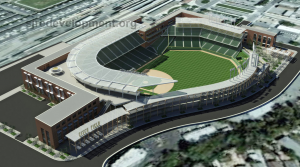
Local activists are on a public crusade to block San Jose’s efforts to build a baseball stadium in its downtown Diridon district, objecting most vehemently to the plan’s costs. Controversy has escalated since November, following the city council’s vote to offer Oakland A’s owner Lew Wolff 5.5 acres of land downtown for less than a third of what the city paid for it.
Whereas San Jose originally paid $25.1 million for the land, the city is only asking Wolff for $6.9 million to build a baseball stadium there.
What the city views as an investment in a major league future, the some anti-stadium groups consider it to be a big break for wealthy developers. They condemn the council’s decision in these tumultuous economic times.
In the current context of widespread cuts to public services and threats to firefighter and police officer pensions in San Jose, citizens are carefully scrutinizing every spending decision. An ordinance mandating a public vote before committing city resources to building any professional sports facility puts San Jose’s hopes of being professional baseball’s newest city in its citizens’ hands.
But Marc Morris of the anti-stadium group BetterSense San Jose worries that residents and businesses won’t benefit from the stadium.
“[The stadium] is a really terrible urban planning and terrible use of that site,” Morris said. “Just blocks of dead zone with nothing happening there, it’s going to discourage people from walking through that area.”
Stadiums and professional sports teams are no magical cure-all in an ailing economy, he said.
San Jose planners say a state-of-the-art baseball stadium is the key to their vision of turning the downtown area of Diridon into a model urban transit hub worthy of international acclaim.
“It’s a branding thing. How are you branding San Jose?” said Michael Brilliot, a senior planner at the San Jose Planning Commission. “Having a Major League Baseball team would help to build San Jose’s brand.”
Diridon Station currently sees a steady buzz of commuters and visitors coming to enjoy the diverse surrounding development, which includes housing and industrial properties to the east, as well as HP Pavilion, a sports and entertainment arena, just across the station’s parking lots. Also within walking distance is the local business district known as The Alameda, for which the city recently approved funds to renovate its streets in efforts to draw more people to its shops.
But city officials believe that the new Diridon Station will be a showpiece of San Jose, earning it the same name recognition as its globally prominent neighbor to the north, San Francisco.
For Brilliot, this combination of world-class transit depot and a professional baseball team will entice people to visit, invest money, build businesses, and even move to the area, translating to financial returns far beyond the city’s investment on the stadium. Turning Diridon into a regional destination is a cause around which both proponents and opponents of the baseball stadium can rally, city officials believe.
According to Morris, however, the economic vitality one would expect from a new stadium is actually harmful to existing businesses. Businesses thrive from stable, local clientele bases, not from people visiting for 81 games a year, Morris said, citing the Neighborhood Economic Impacts report the consulting group Bay Area Economics prepared for the city in 2006.
Morris says that to boost the economy, the city ought to invest in more commercial and residential development around the station. He believes that the baseball stadium, rather than take advantage of the Dirdon’s dynamism as a major transit hub, creates an economic void.
“If you look at a city like Detroit, it has professional hockey, professional basketball, professional football, professional baseball, it had a Super Bowl. And what do we think of Detroit?” Morris said. “We think of economic collapse, and ‘I don’t want to go there.’ So it doesn’t work.”
To allay public skepticism concerning the financial returns that a baseball stadium could generate, city officials have been quick to cite a previous stadium investment in HP Pavilion, home to the NHL’s San Jose Sharks.
A 2008 study the consulting group Sports Economics prepared for the city calculated that the arena, which is also located in the Diridon area, brings over $5.8 million in total taxation annually. Morris said this is nothing but another one of the city’s economic sleights-of-hand since the study leaves out important costs the city pays, like the interest on the arena’s debt and cost of arena maintenance.
If included, Morris said these figures would show that the city loses money every year from having built HP Pavilion and continuing to maintain it.
“[Stadium proponents] only ever talk about the revenue, they never talk about the costs,” Morris said. “It’s very easy to tell a good story when you do that.”
